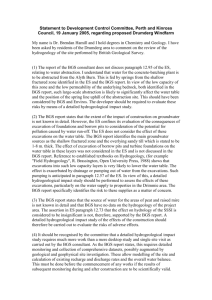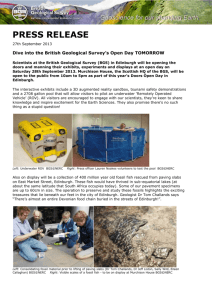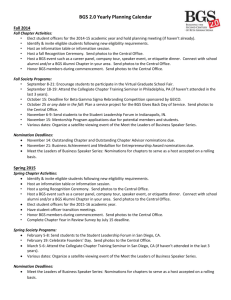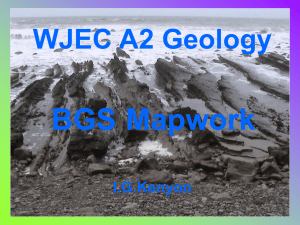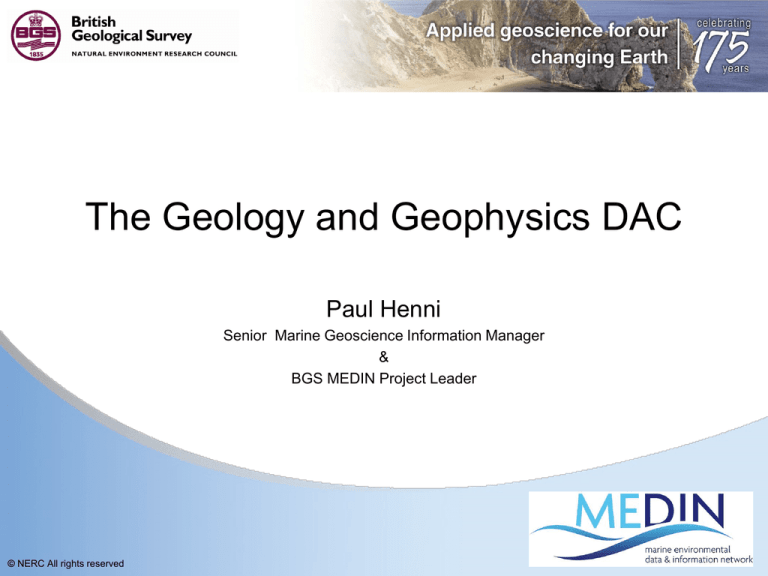
The Geology and Geophysics DAC
Paul Henni
Senior Marine Geoscience Information Manager
&
BGS MEDIN Project Leader
© NERC All rights reserved
What is the British Geological Survey (BGS)?
Founded in 1835, it is the world's oldest national geological survey and is responsible for advising the UK
government on all aspects of geoscience as well as providing impartial geological advice to industry,
academia and the public.
The BGS is a Natural Environment Research Council (NERC) research centre and also manages the
National Geoscience Data Centre (NGDC).
The National Geoscience Data Centre (NGDC)
This national collection is used to support the Survey's own mapping programme, and is the NERC's
designated data centre for the earth sciences.
The National Geoscience Data Centre (NGDC) holds a comprehensive collection of geological and
environmental information which is available to the public, industry and academia.
The Data Centre manages earth science datasets, physical collections, records and other information
It is also a registered ‘place of deposit' under the terms of the Public Records Act 1958.
© NERC All rights reserved
BGS Marine Information and Data Management Team
We have a team drawn from a range of specialisms and areas of BGS who work together to receive, QC,
load, manage and deliver Marine Data and Information.
We work closely with our Marine Operations Team, our Geoscientists and our external customers to ensure
there is a coherent and documented system that meets requirements. The Team is also responsible for
running the BGS MEDIN DAC, with Marine Survey data managed using the same system as for BGS own
data holdings.
© NERC All rights reserved
The BGS MEDIN DAC for Geology and Geophysics
Three areas of work have been undertaken by BGS to date:
•Oil and Gas Site Survey information collection and delivery (ongoing), plus publication of a
Feasibility Study on potential further work.
•Pilot Archiving of three Marine Surveys (Joint Nature Conservation Committee (JNCC) Special
Areas of Conservation (SAC) Surveys), working with partner DACs.
•Delivery of MEDIN-compliant metadata for BGS held Strategic Environment Assessment (SEA)
Information and Data.
Further work is under discussion to archive more JNCC SAC Surveys, MALSF/MEPF Surveys,
Archaelogical Marine Survey data and others.
© NERC All rights reserved
BGS MEDIN DAC Data Submission
Oil and Gas Site Survey information is now collected through the DECC Pon14a regulation to provide
details of where these have taken place and where to go for the data.
Work is ongoing on the feasibility of getting new and legacy data archived with the BGS DAC. This is
managed via the medin@bgs.ac.uk mailbox
Submission of Marine Survey data to the BSG DAC has not yet been documented. A Short Guide will be
prepared drawing on experience from the Pilot Archiving.
Each potential submission would require an index, details of the data types and a Cruise Report. BGS
have guideline costs which provide a starting point and can provide an estimate of likely costs and
timescales.
Please email the medin@bgs.ac.uk mailbox if you have data you would like us to archive.
Any data submissions will be subject to BGS reviewing and accepting what is being proposed. Additionally,
scheduling will be subject to BGS specialist staff availability.
© NERC All rights reserved
BGS MEDIN DAC Data Treatment
Oil and Gas Site Survey information is processed using documented BGS QC procedures which draw on
our experience from UK Digital and Energy Atlas (DEAL) data management work . Information is checked
for consistency and completeness. On loading to the Oracle DB, procedures are run to ensure that DB
checks and constraints applicable to the data are met.
BGS Marine Survey data is processed using documented BGS QC procedures derived from the BGS
Open Report: Marine Survey Data Management Handbook – BGS Specifications. This is available via the
NERC Open Reports Archive (NORA) or from the BGS website.
Standard folder structures and naming conventions are used and are expected on delivery of survey data to
the DM Team. A detailed checklist is maintained as an audit trail of work done. Manual checks are made
on the data content and the related information. On loading to the Oracle DB, procedures are run to ensure
that DB checks and constraints applicable to the data are met. Appropriate data types are archived offline
in the BGS Archive system.
MEDIN DAC Marine Survey data archived with BGS uses the same conventions and procedures
described above, to ensure consistency, reduce overheads and ensure operational efficiency. Ideally, data
provided to BGS should follow the BGS standard.
© NERC All rights reserved
BGS MEDIN DAC Benefits of Submission
The long-term archiving and delivery of key Marine datasets, embedded within the BGS NGDC as part of
the NERC managed data holdings. Metadata delivery to meet the requirements of national and
international standards (MEDIN, UKGEMINI, ISO19115, INSPIRE). BGS are working with European
Partners on the GEO-SEAS Project to disseminate data and information more widely.
BGS MEDIN DAC Data Delivery
Oil and Gas Site Survey information was previously unavailable outwith Operators and Contractors is now
delivered for harvesting from the BGS OAI service to the MEDIN Portal and wider. BGS are working to
provide more detailed location information on the BGS website (Offshore Geoindex on www.bgs.ac.uk).
This integrates BGS holdings with MEDIN DAC data.
Marine Survey data are delivered in the same way as above and BGS are working towards online data
delivery.
The SEAs metadata is available, again as above, and will be downloadable via the upcoming re-launched
SEAs data website.
Additionally, BGS have a dedicated Marine Enquiries Team , with a monitored mailbox at
offshoredata@bgs.ac.uk , to assist customers to find data and information, and to meet FOI , EIR and
other regulatory requirements.
© NERC All rights reserved
And some pictures…BGS Marine Geoscience Data, plus MEDIN DAC Data and details are of an OandG Site
Survey
© NERC All rights reserved
What it can all be used for…Draft 1:50K Environmental Map Extract from new MAREMAP Initiative
Full paper map available to view
later
© NERC All rights reserved
UK Marine Environmental Mapping Programme (MAREMAP)
The MAREMAP Initiative: Objectives
•Interpretations made available on the web – free of charge, no restrictions on use
•Delivery in layered pdf interactive map format
•Free automated reports at regional scale
•Detailed reports , GIS/3D products available at cost recovery
•Scientific publications
© NERC All rights reserved
Contributing to European mapping (EMODNET)
© NERC All rights reserved
What is Geo-Seas?
•
EU Framework 7 project; part of the Integrated Infrastructure Initiative (I3) of
the Research Infrastructures Programme;
•
1st May 2009 until 31 October 2012
•
28 partner organisations from 17 European maritime countries
•
26 marine geoscience data centres (Geo-Seas nodes)
•
e-Infrastructure areas
◦ Scientific Data (coherent management and access to data)
◦ Standards (data management, metadata, exchange/delivery formats,
delivery methods)
•
e-Infrastructure communities
◦ Geoscience, Oceanography, Environment, Resources, Engineering
© NERC All rights reserved
Geo-Seas Objectives
•
Creation of a unified marine geoscientific data
infrastructure across Europe (data grid)
•
Facilitate the location, accessing and delivery of
federated marine geological and geophysical datasets
•
Develop interoperability with other data types =
integrated multidisciplinary science
•
Underpin key European Directives such as INSPIRE and
framework programmes e.g. GEOSS and GMES
© NERC All rights reserved
Current progress
•
Common vocabularies agreed
•
Standards for data and metadata formats agreed by
partners
• INSPIRE compliant
• conforming to ISO 19115 family of standards
•
Tools (MIKADO) to generate and access metadata
(OGC – Compliant in V2) available to partners
© NERC All rights reserved
Current progress
•
•
Training for partners
•
to ensure that management procedures are coherent within the
consortium
•
to transfer expertise and to train IT experts of the SeaDataNet
data centres in the installation and operation of the SeaDataNet
technical components
Questionnaire preliminary report
© NERC All rights reserved
Further information:
http://www.geo-seas.eu
or
© NERC All rights reserved
Contact the Geo-Seas Coordinator:
hmg@bgs.ac.uk
Submitting data to (and
getting data from!) BODC
Adam Leadbetter
British Oceanographic Data Centre
Joseph Proudman Building
6 Brownlow Street
Liverpool L3 5DA, UK
BODC – A little background

